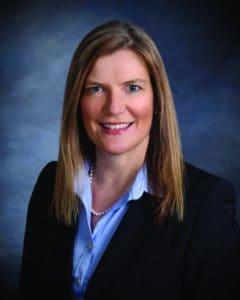Editor’s Note: North Dakota Gov. Doug Burgum appointed Lise Kruse as the Department of Financial Institutions’ 26th Commissioner, effective Dec. 1, 2017. Prior to joining the DFI in 2004, Kruse worked for a life insurance company in Fargo, N.D. Kruse has a Bachelor of Arts degree from Concordia College, Moorhead, Minn., with majors in business and organizational communication. In 2003, she obtained a Master of Business Administration degree with an emphasis in information technology from the University of Colorado in Colorado Springs. Kruse is a 2012 graduate of the Graduate School of Banking at Colorado, Boulder.

Q: With seven years of experience as an examiner and then seven more as North Dakota’s chief examiner, how has your time in the DFI already prepared you for this new position?
Kruse: If I wouldn’t have had that experience, I don’t think I would have gone for this. I know the industry, I know the bankers and what is important to them. … I believe in our community banks. They need to be able to serve their communities at the best of their abilities. If our office is strong, we have the ability to be a voice for the community banks out in Washington, D.C.
Q: You mention knowing what is important to community bankers. In your mind, what are the items at the top of that list?
Kruse: Regulation needs to be scaled where it makes sense. I don’t think it makes sense to have the regulation that is defined for the large banks on Wall Street applying to a small community bank. A lot of what has happened in the more recent years has really created a burden for our banks to be able to serve their communities. One area would be mortgages have become more difficult for our rural banks. They end up not even doing mortgages.
For the customer, they should be able to go to their local bank and get those services, but it has become so challenging and difficult for our banks to sometimes serve their communities.
Q: What other emphases do you intend to bring to the commissioner’s office?
Kruse: We are not just there to be regulators. We are also there to be a resource. We get to go to every single bank. We see what works. There are a lot of regulations, a lot of accounting rules — I just appreciate the opportunity for bankers that they can call us and we can help them do some of that. In a way, it’s a partnership, as well.
Q: Do you view yourself as an advocate for community banks?
Kruse: We want small institutions to stay in the community. I believe that for a smaller community, especially, they really are the lifeblood of that community. Over the years when we travel the state, if there’s a bank, then there’s some economic development. The farmers can go to a local bank. If that bank shuts down, it just makes it harder.
That’s my No. 1 objective.
Q: How can you assist those banks in rural communities, struggling through a difficult agricultural lending cycle, to be sure they are still there?
Kruse: We have 69 state chartered banks, and I am just a phone call away. I think they all know, anytime they have any questions or now with the new accounting rules coming up, they can call us and they will get advice.
Obviously, we’re not going to tell them how to run a business. We know there’s a line there, but we can definitely provide resources and the one thing that I think the state system can sometimes do better than the federal version is that we don’t have all that red tape.
Going forward, that’s what I want, to continue to be a resource and make it easier, not harder, for them. Communicating that to the industry can make a big difference.
